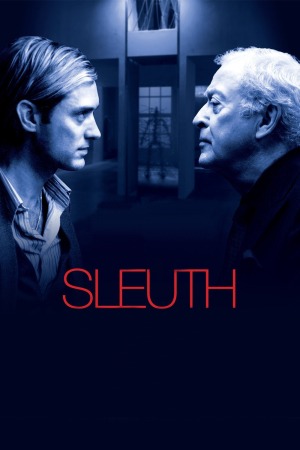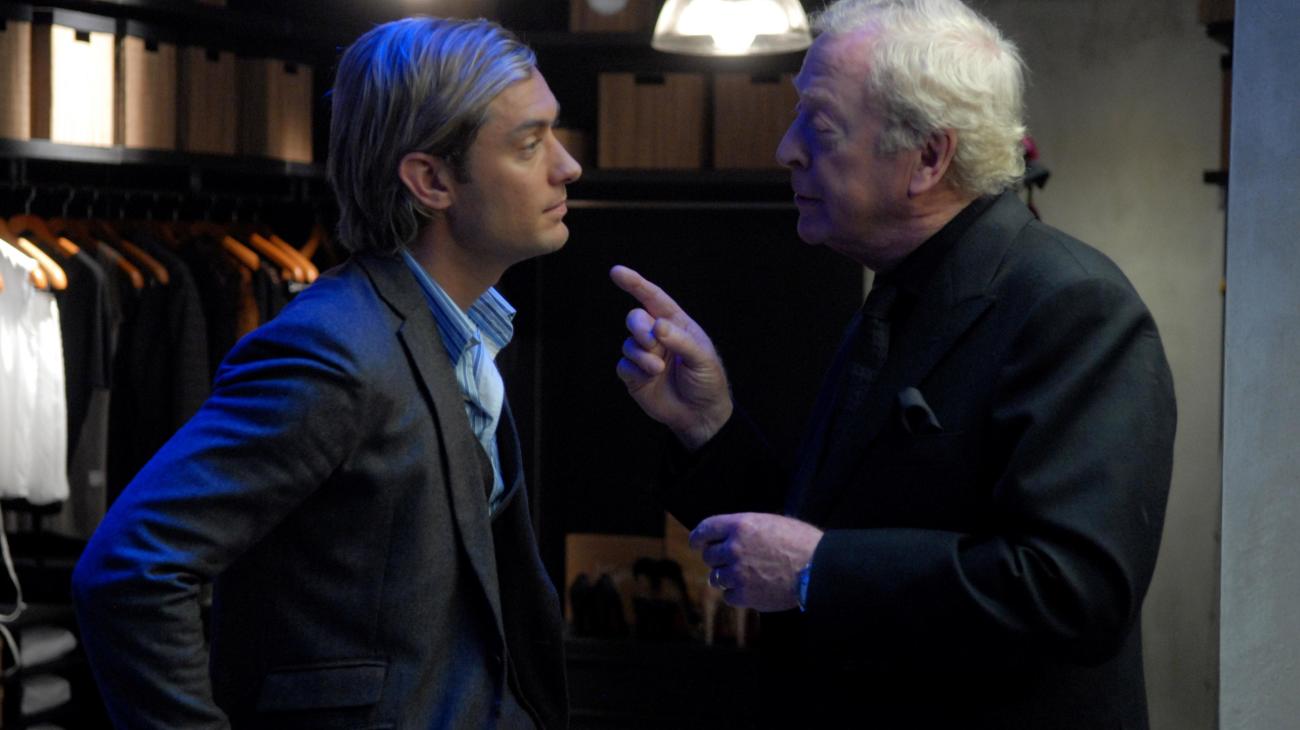
Crimes and misdemeanors
I went back and forth a great deal on the new version of Sleuth. In most ways, it's very interesting (and not always for the better) and it certainly does not labor in the shadow of the first film made from this material, in 1972 - I tend to agree with the current project's creative team that it is not a remake so much as a new adaptation of Anthony Shaffer's 1970 play that exists without reference to the original. The acting is extremely good but not extraordinary, and each of the two players (Michael Caine and Jude Law) have a few line-deliveries scattered throughout that simply fall flat. The production design is wonderful, the pace is swift, the script is full of dialogue that would murder onstage but comes off as slightly arch on camera.
Ultimately I must regard it as a failure, because with time to think it over I find that what stands out the most is the freakishly misguided work done by director Kenneth Branagh, whom I have liked and suppose I shall probably like again. Frankly, I don't know if I would have ever expected him to have enough personality in his direction as to make something so willfully confusing as Sleuth, turning in work that achieves the rare feat of beating me. You see, ordinarily it's not terribly hard to figure out what a director is trying to achieve. Perhaps it's not always the case that the director succeeds, and sometimes he or she is just trying to achieve "be as impersonal and marketable as possible," but you can figure it out without too much work.
Not so, Branagh and Sleuth. His vocabulary for this film is aggressively eclectic, but not to any understandable purpose. The film is much taken up with close-ups, tight and frightening close-ups on Caine and Law that cut with every line of dialogue; and that's positively jejune next to his highly idiosyncratic trick of framing such that whatever we would expect and desire to see is cut off, and a whole conversation will be focused on the actors' shins, for example. It's much too specifically bizarre to be an accident, and the only conclusion is that Branagh had some very specific aesthetic goal in mind, but unless that goal was confusing the hell out of the audience, he did not succeed. There are two possibilities: he is a crazy fool, or he is such a genius of cinema that he's operating on a level I can't even begin to perceive. Given that his career has included Mary Shelley's Frankenstein and the 2000 musical version of Love's Labors Lost, I'm not inclined towards the latter interpretation.
And that's too bad, because while nothing about the film would ever be "great," there's plenty that is weirdly compelling. Harold Pinter's screenplay, for a start, which launches from the same opening as the play and earlier film - out-of-work actor Milo Tindle (Law) visits the absurdly overwrought country manor whom of novelist Andrew Wyke (Caine) to ask the older man to grant his wife, Tindle's lover, a divorce, and mind-games ensue - and goes in an altogether fresh direction, stressing the story's latent three-act structure and significantly ramping up its homoeroticism. Pinter also fills the script full of dialogue that is simultaneously over-stylised and naturalistic, giving both men plenty of sharp, clipped lines that bounce back and forth like a crazed game of verbal table tennis. For a stage-derived narrative involving two men in one location, it's perhaps surprising that only the dialogue comes across as set-bound; perhaps it is a limitation of Pinter's art that he doesn't even recognise that film writing is inherently different than theatrical writing, and what comes across as invigorating and fluid on stage is oddly clunky and artificial in a movie, especially when the editing calls maximum attention to the peculiar flow. Perhaps a great director could have made the script sing, but instead it just feels indefinably but unmistakable "off."
In this atmosphere, the two actors haven't much of a chance to shine, but they're both awfully fun to watch. The theatrical dialogue is almost a merit, really, given how much it gives them to tear into when they're not exchanging sarcastic tones of voice and bug-eyed stares. Comparisons to the original aren't helpful, but it's hard not to think about it here: Laurence Olivier (in Caine's role) and a younger Caine (in Law's) were men of two entirely different acting universes, one classical and Shakespearean, one an Angry Young Man. In the new generation, Law essentially is Caine, perhaps a bit more genteel than streetwise, but they both have a similar pretty-boy asshole vibe, and this isn't even the first time Law has played a Caine role in a remake. All this is certainly a bit gimmicky, but it's the sort of gimmick that at least gives you something to chew on.
There's little depth to much of anything, but watching two fine actors shout zingers at each other inside a wildly overdetermined house that could never be anything other than a set has its own special charm. Which brings me back to Branagh, and his half-cocked idea of what makes for clever imagery, and his general inability to do much of anything that makes sense, and I feel a bit sorry for what might have been. This was never going to be a masterpiece, but it didn't have to be nearly so frustrating.
Ultimately I must regard it as a failure, because with time to think it over I find that what stands out the most is the freakishly misguided work done by director Kenneth Branagh, whom I have liked and suppose I shall probably like again. Frankly, I don't know if I would have ever expected him to have enough personality in his direction as to make something so willfully confusing as Sleuth, turning in work that achieves the rare feat of beating me. You see, ordinarily it's not terribly hard to figure out what a director is trying to achieve. Perhaps it's not always the case that the director succeeds, and sometimes he or she is just trying to achieve "be as impersonal and marketable as possible," but you can figure it out without too much work.
Not so, Branagh and Sleuth. His vocabulary for this film is aggressively eclectic, but not to any understandable purpose. The film is much taken up with close-ups, tight and frightening close-ups on Caine and Law that cut with every line of dialogue; and that's positively jejune next to his highly idiosyncratic trick of framing such that whatever we would expect and desire to see is cut off, and a whole conversation will be focused on the actors' shins, for example. It's much too specifically bizarre to be an accident, and the only conclusion is that Branagh had some very specific aesthetic goal in mind, but unless that goal was confusing the hell out of the audience, he did not succeed. There are two possibilities: he is a crazy fool, or he is such a genius of cinema that he's operating on a level I can't even begin to perceive. Given that his career has included Mary Shelley's Frankenstein and the 2000 musical version of Love's Labors Lost, I'm not inclined towards the latter interpretation.
And that's too bad, because while nothing about the film would ever be "great," there's plenty that is weirdly compelling. Harold Pinter's screenplay, for a start, which launches from the same opening as the play and earlier film - out-of-work actor Milo Tindle (Law) visits the absurdly overwrought country manor whom of novelist Andrew Wyke (Caine) to ask the older man to grant his wife, Tindle's lover, a divorce, and mind-games ensue - and goes in an altogether fresh direction, stressing the story's latent three-act structure and significantly ramping up its homoeroticism. Pinter also fills the script full of dialogue that is simultaneously over-stylised and naturalistic, giving both men plenty of sharp, clipped lines that bounce back and forth like a crazed game of verbal table tennis. For a stage-derived narrative involving two men in one location, it's perhaps surprising that only the dialogue comes across as set-bound; perhaps it is a limitation of Pinter's art that he doesn't even recognise that film writing is inherently different than theatrical writing, and what comes across as invigorating and fluid on stage is oddly clunky and artificial in a movie, especially when the editing calls maximum attention to the peculiar flow. Perhaps a great director could have made the script sing, but instead it just feels indefinably but unmistakable "off."
In this atmosphere, the two actors haven't much of a chance to shine, but they're both awfully fun to watch. The theatrical dialogue is almost a merit, really, given how much it gives them to tear into when they're not exchanging sarcastic tones of voice and bug-eyed stares. Comparisons to the original aren't helpful, but it's hard not to think about it here: Laurence Olivier (in Caine's role) and a younger Caine (in Law's) were men of two entirely different acting universes, one classical and Shakespearean, one an Angry Young Man. In the new generation, Law essentially is Caine, perhaps a bit more genteel than streetwise, but they both have a similar pretty-boy asshole vibe, and this isn't even the first time Law has played a Caine role in a remake. All this is certainly a bit gimmicky, but it's the sort of gimmick that at least gives you something to chew on.
There's little depth to much of anything, but watching two fine actors shout zingers at each other inside a wildly overdetermined house that could never be anything other than a set has its own special charm. Which brings me back to Branagh, and his half-cocked idea of what makes for clever imagery, and his general inability to do much of anything that makes sense, and I feel a bit sorry for what might have been. This was never going to be a masterpiece, but it didn't have to be nearly so frustrating.
Categories: british cinema, needless adaptations, thrillers






